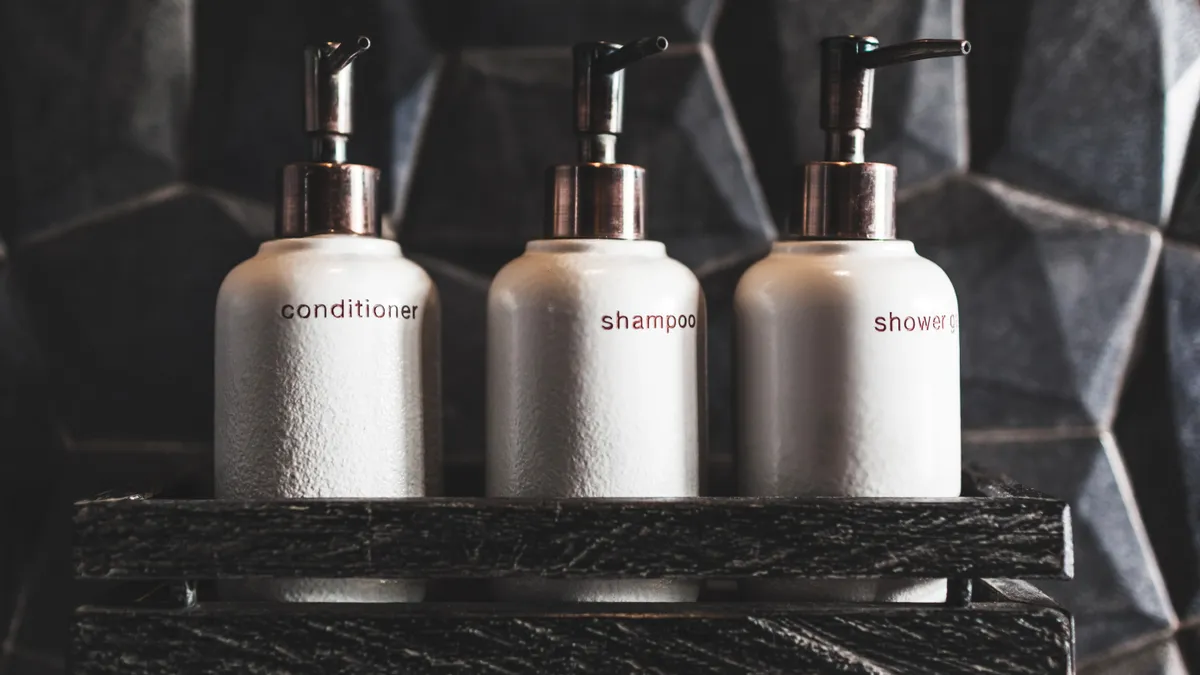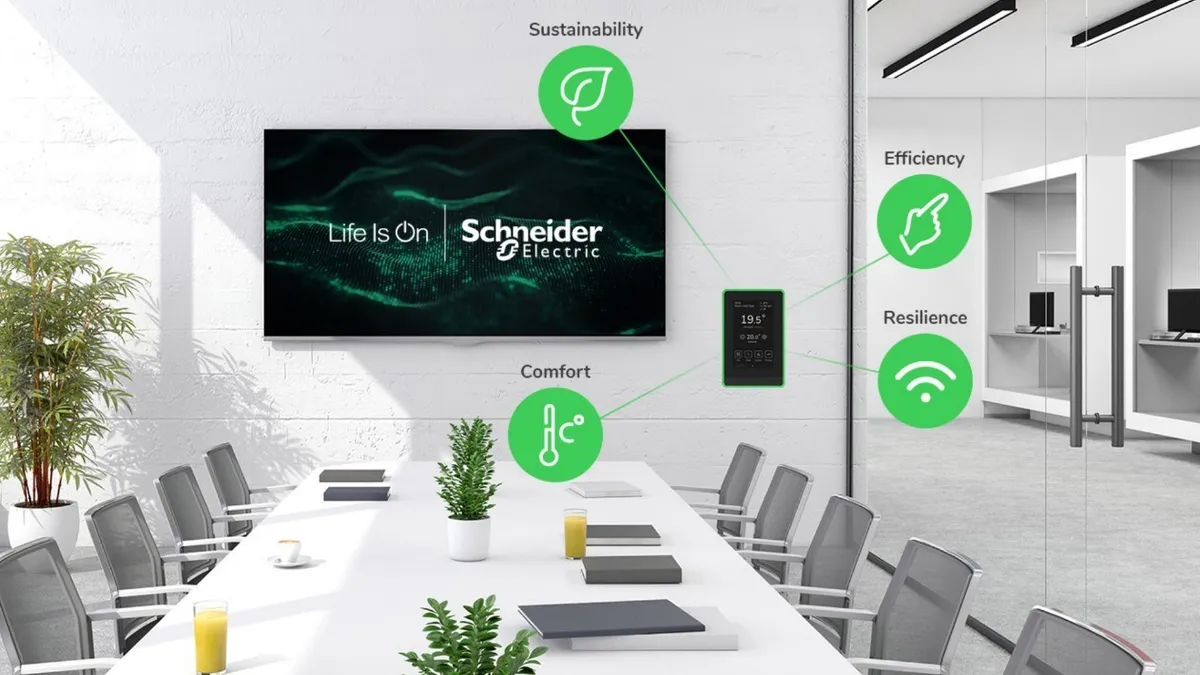Forgot your shampoo? You may now find a refillable large-format dispenser in your hotel room shower stall. The little bottles and sachets of personal care products may be checking out permanently as new laws and consumer preferences for sustainable amenities result in the gradual replacement of single-use plastic toiletries with alternatives.
In April, Washington state legislators became the latest to pass a bill banning single-use plastic packaging in hotel rooms. Washington’s law will begin Jan. 1, 2027, for 50-plus room hotels and the following year for smaller establishments — plus a $500 per day fine for those in violation (although fines max out at $2,000 a year).
The first such law came from California in 2019; it takes effect this year for larger hotels and in 2024 for those with fewer than 50 rooms. Those rules specify that containers 6 ounces or smaller now can only be offered by customer request. New York's similar rules kick in next year for larger hotels and in 2025 for smaller ones. Legislators introduced a similar bill in Hawai’i this year, but it didn’t gain traction.
Dan Bornholdt, founder of Green Suites Hotel Solutions, which has provided toiletries and dispensers to the hospitality industry for 30 years, said that hotel clients save between 30% and 70% of their amenity costs when they switch to refillable dispensers. He added that the company's sales have "grown at a pretty nice clip" as toiletry dispensers become the status quo.
Large format refillable toiletries used to be associated with budget accommodations, he said, but that's changing. At any tier, he doesn't credit a sudden rush of environmentalism as the cause. "I would say that maybe 20% of hotels are doing this for environmental reasons," he said. "I'll say everybody is doing it for environmental marketing."
After piloting a switch in 2018, Marriott International expanded the program to all of its properties, a change which it says will be completed this year.
"Marriott continues to execute on our residential-sized amenities program, switching from small toiletry bottles to larger pump-topped bottles of shampoo, conditioner, and body gel. While we continue to face supply chain headwinds, we are committed to execution and expect the vast majority of our brands to have completed the switch in 2023," wrote Christin Fernandez, director of strategic communications and media relations, in an email.
Similarly, Hyatt Hotels Corp. announced a move to large format toiletries in 2019. The company didn't respond to requests for comment.
What's not sustainable, Bornholdt pointed out, is dispenser systems that aren't refillable but instead switch out large-format containers.
"There is virtually zero environmental benefit to that," he said. "All you were doing is throwing tiny little plastic bottles away, and now you're just throwing a much bigger bottle away."
Brandon Frank, president of Pacific Packaging Components, cautioned that refillables need to be durable, tamper-proof and easy to clean and refill. A wall-mounted dispenser is probably the easiest solution, he said; although pumps on bottles don't last very long, so a disk-top closure may be the better choice.
"There are less moving parts," making dispensing a little easier from a functional standpoint, he said. "But then you're still dealing with the issue of having to reclean everything every time."
Frank said that more attention could be paid to the type of plastic chosen, like opting for a clear PET bottle instead of black HDPE for the refillable containers, and their recyclability could also be increased.
"I think more thought could go into the design, style, function and size of the type of plastics that are being used to increase the likelihood that they're going to be recycled," he said.
Broadly speaking, research shows guests are looking for environmentally friendly lodging. And while hotels use branded toiletries as a marketing tool to signal luxury and exclusivity, the end of minis could signal the beginning of a larger trend of reducing or eliminating the in-room amenities.
Hotels only began offering free toiletries in the 1970s. While the practice is now standard, many guests are likely to travel with their own products. One study found, for example, that guests don't use packaged soaps; some non-profits recycle the discarded hotel soaps. An alternative is to provide toiletries upon request at the front desk. Even if people don’t use them, Bornholdt said they may take them home as mementos.
But for hotels, the driving consideration is likely economics, pure and simple, said Bornholdt. "I think that pricing savings for refillable dispensers is going to drive this much more than governmental action.”
The switch to refillables could also help hotels simplify their company-wide recycling programs, said Rob Kaszubowski, principal of packaging optimization with supply chain consulting business Chainalytics. He said one reason minis don’t get recycled often is because they’re so small and don’t get captured in recycling streams. With a switch to refillables, hotels won't have to manage their compliance with different recycling rules in different regions and figure out what's acceptable at different MRFs.
"That eliminates whether it's recyclable or not from the equation," Kaszubowski said. "Because it's hard to paint everything with a broad brush these days and stamp it as 100% recyclable."
In the bigger picture, he said, there are probably efficiencies gained with larger sizes that will "ripple all the way through to the end of the hotels' supply chains."
On the other hand, he pointed out, refillables could add to room turnover time, which is a consideration because of labor shortages. But he also said the change in how toiletries are offered — if it all — is in line with the overall trend of simplification, like retailers that are offering fewer product options.
But as consumers become more aware of the environmental impacts of their own choices and sustainable amenities, they could very well help drive a “paradigm shift,” Kaszubowski said.
Regardless of what change they make, PPC’s Frank suggested they provide some guest education — just like they've done for laundry and water conservation.
"I think there would have to be educational pieces in the room and prior to booking to explain the reasoning behind it," he said. "I think once it's understood by the customer, then I think they'll support it.


















